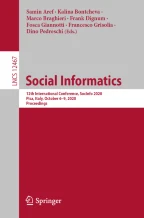Part of the book series:Lecture Notes in Computer Science ((LNISA,volume 12467))
Included in the following conference series:
2519Accesses
Abstract
In this paper we study social exclusion in social (information) networks using a game-theoretic approach, and study the stability of a certain class community structures that are a Nash equilibrium. The main result of our analysis shows that all stable community structures (Nash equilibria) in this class are community structures under which some agents are socially excluded, and do not belong to any of the communities. This result is quite striking as it suggests that social exclusion might be the “norm” (an expected outcome) in social networks, rather than an anomaly.
This is a preview of subscription content,log in via an institution to check access.
Access this chapter
Subscribe and save
- Get 10 units per month
- Download Article/Chapter or eBook
- 1 Unit = 1 Article or 1 Chapter
- Cancel anytime
Buy Now
- Chapter
- JPY 3498
- Price includes VAT (Japan)
- eBook
- JPY 9723
- Price includes VAT (Japan)
- Softcover Book
- JPY 12154
- Price includes VAT (Japan)
Tax calculation will be finalised at checkout
Purchases are for personal use only
Similar content being viewed by others
References
Aktinson, A.B.: Social exclusion, poverty and unemployment. In: Aktinson, A.B., Hills, J. (eds.) Exclusion, Employment and Opportunity. CASE paper 4. London School of Economics (1998)
Balcan, B., Braverman, M.: Nash equilibria in perturbation-stable games. Theory Comput.13(13), 1–31 (2017)
Beall, J.: Globalization and social exclusion in cities: framing the debate with lessons from Africa and Asia. Environ. Urban.14(1), 41–51 (2002)
Candogan, O., Ozdaglar, A., Parrilo, P.A.: Near-potential games: geometry and dynamics. ACM Trans. Econ. Comput.1(2), 1–32 (2013)
Carrington, M., Marbach, P.: Community structures in information networks. In: Avrachenkov, K., Huang, L., Marden, J.R., Coupechoux, M., Giovanidis, A. (eds.) GameNets 2019. LNICST, vol. 277, pp. 119–127. Springer, Cham (2019).https://doi.org/10.1007/978-3-030-16989-3_9
Fudenberg, D., Kreps, D.M.: Learning mixed equilibria. Games Econ. Behav.5, 320–367 (1993)
Hofbauer, J., Sandholm, W.: On the global convergence of stochastic fictitious play. Econometrica70(6), 2265–2294 (2002)
Li, B., Carrington, M., Marbach, P.: Stable community structures and social exclusion.arxiv:2007.14515 (2020)
Mathieson, J., et al.: Social exclusion: meaning, measurement and experience and links to health inequalities - a review of literature. WHO Soc. Exclus. Knowl. Netw.1, 91 (2008)
Jackson, M.O., Rodriguez-Barraque, T.: Epsilon-equilibria of perturbed games. Games Econ. Behav.75(1), 198–216 (2012)
Author information
Authors and Affiliations
The University of Hong Kong, Pok Fu Lam, Hong Kong
Boxuan Li
University of Toronto, Toronto, Canada
Martin Carrington & Peter Marbach
- Boxuan Li
You can also search for this author inPubMed Google Scholar
- Martin Carrington
You can also search for this author inPubMed Google Scholar
- Peter Marbach
You can also search for this author inPubMed Google Scholar
Corresponding author
Correspondence toPeter Marbach.
Editor information
Editors and Affiliations
Max Planck Institute for Demographic Research, Rostock, Germany
Samin Aref
University of Sheffield, Sheffield, UK
Kalina Bontcheva
King’s College London, London, UK
Marco Braghieri
Umeå University, Umeå, Sweden
Frank Dignum
ISTI-CNR, Pisa, Italy
Fosca Giannotti
University of Pisa, Pisa, Italy
Francesco Grisolia
University of Pisa, Pisa, Italy
Dino Pedreschi
Rights and permissions
Copyright information
© 2020 Springer Nature Switzerland AG
About this paper
Cite this paper
Li, B., Carrington, M., Marbach, P. (2020). Stable Community Structures and Social Exclusion. In: Aref, S.,et al. Social Informatics. SocInfo 2020. Lecture Notes in Computer Science(), vol 12467. Springer, Cham. https://doi.org/10.1007/978-3-030-60975-7_13
Download citation
Published:
Publisher Name:Springer, Cham
Print ISBN:978-3-030-60974-0
Online ISBN:978-3-030-60975-7
eBook Packages:Computer ScienceComputer Science (R0)
Share this paper
Anyone you share the following link with will be able to read this content:
Sorry, a shareable link is not currently available for this article.
Provided by the Springer Nature SharedIt content-sharing initiative


